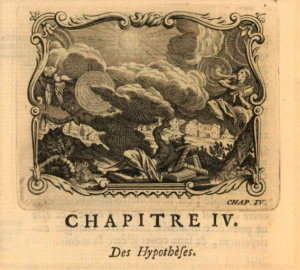Du Châtelet’s architecture of science in her chapter on hypotheses: a priori and a posteriori knowledge
Principles and observations are the methodological means for guiding deductions, but are no longer primary in the search for causes. Principles and observations serve no longer as pathfinders of causes but became secondary instruments for the justification of hypotheses. These methodological instruments now serve to confirm or to reject the proposition stated.
As the search for causes is by nature in most cases in vain, since causes are too far removed – too far in the sense of logical deduction, but also too far in the sense of observation – most of the causes will never be discovered. For Du Châtelet, the case of astronomy is an exemplary model for that claim. False propositions, such as God as a final cause or the claim that knowledge is gained by observation (and/or mathematics), have been proved as non-sufficient or offer only partial explanations. The third investigational method must consequently be practiced; hence hypothetical thinking is crucial:
So making hypotheses is allowed, and it is even very useful in all cases when we cannot discover the true reason for a phenomenon and the attendant circumstances, neither a priori, by means of truths that we already know; nor a posteriori, with the help of experiments (IP 1740eZ §60)
For more, see: Ruth Edith Hagengruber: Du Chatelet on Hypotheses, in: Teaching Women Philosophers. Ideas and concepts from over 2000 years. (https://link.springer.com/book/9783031592973)
You cannot copy content of this page









